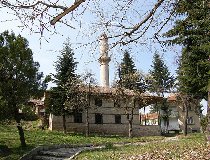The rising anti-Muslim rhetoric ahead of a July parliamentary election have raised tensions in the country.
Twenty years after Bulgaria's then-Communist regime mounted an official campaign of persecution against its Muslim minority, could bring the nightmare back.
Mustafa Yumer, a Bulgarian Muslim, led resistance and hunger strikes against an assimilation drive to force Muslims to adopt ethnic Bulgarian names in the spring of 1989. Now he says growing anti-Muslim rhetoric is fomenting ethnic hatred and opening old wounds.
"We are all very worried," said the 65-year-old philosopher and former teacher. "People are scared by far-right parties who preach and want to see Bulgaria becoming a single ethnic nation."
Muslims make up about 12 percent of the Balkan country's 7.6 million people and they are native in European Union member - Bulgaria. Most are the descendants of ethnic Turks who arrived during five centuries of Ottoman rule that ended in 1878. Muslims and Christians live alongside in a culture known as "komshuluk," or neighborly relations.
According to Amnesty International, at least 100 Muslims died in his four-month campaign to force them to change their names to Bulgarian, which banned the Turkish language in public. It also banned the wearing of headscarves and other Islamic customs such as circumcision and funeral rights.
"Inciting hatred"
But the rising anti-Muslim rhetoric of the ultra-nationalist Attack party and hardening attitudes of other rightist politicians towards the Muslims ahead of a July parliamentary election have raised tensions in the country.
Attack is unlikely to form part of the next government, but it has led set the tone for the election campaign.
Ethnic Turks and Pomaks -- Slavs who chose Islam under Ottoman rule -- are shocked and dismayed at the election campaigns.
"If we sit and don't work like Bulgarian patriots, one day they will conquer us indeed. They will annex whole regions," Attack's leader Volen Siderov told an election demonstration in May, inciting phobia and hatred among the citizens, who live peacefully for ages.
There have been over 100 incidents of vandalized mosques and other Muslim buildings in the last 2-3 years.
Girls have been banned from wearing the traditional Muslim scarf in some schools and universities -- Bulgaria's first glimpse of an issue that has raised tensions in Western Europe.
"Often police probes"
Some Muslims fear losing civil rights, gained in the past two decades, and a possible repeat of the repression of the 1980s if nationalists join a coalition government after the July 5 vote.
Commentators say the rise of nationalism has been helped by a combination of voter apathy and discontent at low living standards, high-level corruption and organized crime.
A "revival process" launched by the late communist dictator Todor Zhivkov to forcibly assimilate Muslims culminated with a campaign to force them to change their names, and the exodus of over 300,000 ethnic Turks to neighboring Turkey in 1989.
According to various estimates, between 500 and 1,500 people were killed resisting forced assimilation between 1984 and 1989, and thousands of others went to labor camps.
"The wounds would have been healed by now if some people had stopped poking them," said Fikri Gulistan, 49, dentist in Momchilgrad, where Turkish is the daily language.
Hussein Hafazov, aide to Bulgaria's top Muslim cleric Mustafa Alish Hadji said. "We try to control the mosques and all the rituals. We have been successful so far."
"If we are constantly being blamed that we are terrorists and are dangerous for the security in this country, we don't know whether part of the society won't start feeling that way one day," Hafazov added.
The Chief Mufti office says 323 mosques have been built in the past 19 years mainly with donations from individuals and organizations in Muslim countries, including Turkey.
But police have often investigated a number of foreign Islamic foundations and made some arrests since 2000, however, no charges have been raised.
In March, security services, "acting on the complaint of a rightist politician", launched a probe into a local mayor and an Islamic studies teacher from the village of Ribnovoover over the teaching of religious practice. No charges have been filed but the case filled chat rooms of newspapers and other news providers with anti-Muslim messages such as "Bulgaria for the Bulgarians".
Religious leaders say the Ribnovo case only adds to worries that politicians are threatening the culture of tolerance in mixed communities.
PHOTO CAPTION
A Mosque at the Bulgarian city of Belogradchik.
Source: Agencies


 Home
Home Discover Islam
Discover Islam Quran Recitations
Quran Recitations Lectures
Lectures
 Fatwa
Fatwa Articles
Articles Fiqh
Fiqh E-Books
E-Books Boys & Girls
Boys & Girls  Articles
Articles










